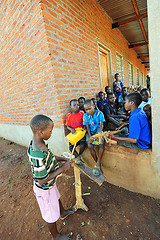In this narrative we are going to discuss 10 things that you should undoubtedly expect from a daycare town that is providing care for your child while you're at work.

Child care centers are not clones. Each one will have dissimilar things available to the child depending on the funds the town has. Some will have many activities and others will have very few. But there are 10 things you should expect from any child care town no matter what their operating funds is.
Child Care
1. Open access To Their town - Parents must be able to call on or walk in on a daycare town at any time unannounced. The provider should also allow the parent to make any estimate of uncostly phone calls in order to check up on their child. The provider and the parent should work out a program for those phone calls to find out the times that are best and also agree on how many phone calls in a day are reasonable.

ABC Arbonne Baby Hair and Body Wash Features
- Vegan Certified, No Animal Testing, Cruelty Free, Formulated in Switzerland, Made in Usa.
Our Price : $9.99
You Save : 29%
Available Stores
|
2. safety For Your Child - The daycare town where your child is staying should be in a safe environment. All potential precautions should be taken to make sure that your child is safe such as, plugging electrical sockets, retention knives and sharp objects in a safe place and out of reach, end off stairways and using only safe and well maintained equipment. If your child has to travel, the provider should also use safety seats and seat belts when traveling.
3. Honesty And trust - Providers should not promise things that they can't do. They should be honest about the care that will be given. Also, there should be confidentiality about your child even being there. Nobody should be given any facts about your child if strangers should call unless you specifically say it's okay.
4. Acceptance Of Parent's Wishes - Centers should make every endeavor to comply with the wishes of the parents such as the food the child will eat, activities the child will or won't participate in and any extra care that needs to be given to the child. If the parents don't want habitancy smoking colse to their child then the environment should be kept smoke free.
5. improve notice Of Any Changes - The town should give the parents abundance of improve notice of any changes that are going to take place that may sway the care of the child. This way the parents can make plans to have the child moved to an additional one town if they are not happy with the proposed changes.
6. No Interference In The Child's family - The child care provider should not talk to the child about any problems the parents may or may not be having. It is not for the child care provider to meddle in the lives of the family. The first and only responsibility is to care for the child.
7. No advice Offered And No Judging Of Parenting Practices - If a child care provider does not agree with some of the parent's methods of raising their child it is none of their business. They are only to offer advice if asked.
8. assurance That everybody In experience With Child Is trustworthy - If it is a large town and there are many habitancy there then each one should be certified to be trustworthy and safe. A town should take all uncostly precautions when hiring staff and should supply the parents with facts on how workers are hired and what screening process everybody goes through.
9. Open transportation - The provider should keep the parents constantly posted of any instances at the town that they should be aware of including the child's improve or lack of progress. The parents should be kept in the loop about all activities the child participates in and those the child has problems with. It should be as if the parent is right there observing.
10. Finally, No Surprises - This means that the provider should not suddenly tell you that they have taken a part time job elsewhere and their immature daughter will now watch the child. Or if at a town you don't want to hear that your child's teacher suddenly disappeared with no conjecture given.
If you are inevitable about all 10 of these items than more likely than not you have found a child care provider that you can feel inevitable in.
Child Care - 10 Things You Should Expect


